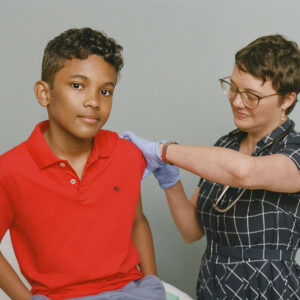Now that the Pfizer COVID-19 vaccine has full FDA approval for individuals 16 years old and older, what happens if a teenager wants to get the shot but her parents say “no?” Or if his mom and dad try to make him get vaccinated against his wishes?
A Delaware Valley legislator is proposing legislation giving minors the right to choose for themselves whether they want a COVID-19 vaccination.
Pennsylvania, like most states, requires parental consent before a minor can get vaccinated.
In May, state Sen. Amanda M. Cappelletti (D- Delaware/Montgomery) announced plans for legislation giving minors the right to make their own vaccination decisions, regardless of their parent’s wishes. Cappelletti will host a press conference on August 30 to discuss the bill.
“The bill language is drafted and we are introducing it in the near future. Over the summer, I’ve had the opportunity to learn more about the different circumstances surrounding people’s views and opinions on vaccines, their hesitancies, and other challenges to becoming vaccinated. I still believe that this is the best way to mitigate some of those challenges and build a society that respects bodily autonomy,” Cappelletti told the Delaware Valley Journal.
There is legal precedence for minor consent laws related to vaccinations. For example, minors in New York do not need a parent’s consent to receive the HPV vaccine. In Delaware, minors 12 years or older do not need a parent’s consent to receive any vaccination.
Currently, Pennsylvania minors between 11 and 18 can get vaccinated without an adult or guardian’s approval, but only to prevent or “treat a sexually transmitted disease and any other disease, infection or condition reportable pursuant to the Disease Prevention and Control Law of 1955.”
The law also allows for the concept of a “mature minor,” but that determination is up to the discretion of the treating physician. It is the responsibility of the physician to determine if a minor is mature enough to understand and appreciate the consequences of a medical procedure.
“The [mature minor] doctrine was developed in common law, meaning that there is no statutorily recognized standard for it. The standard is state-specific and not all states recognize the doctrine,” Larissa Morgan, JD, MBE, of the University of Pennsylvania Carey Law School, said. “In states that recognize the doctrine, however, providers often consider the minor’s age, intelligence, and whether the minor understands and appreciates his/her medical situation, the nature of the procedure, and its consequences, among other factors.”
Morgan and colleagues authored an article on COVID-19 vaccinations of minors without parental consent in “JAMA Pediatrics.” In the article, they outlined “a policy framework that relies on the mature minor doctrine from case law and informed consent bioethical principles, which we argue should serve as the standard for minors to make vaccination decisions independently.”
The Philadelphia school board just unanimously voted to mandate COVID vaccines for all teachers and staff. “As a district, we encourage everyone who is eligible to get vaccinated. We’re partnering with Delaware Valley Community Health to support our families who need access to the state-mandated immunizations,” Christina Clark, communications officer of the School District of Philadelphia, said when asked about minor consent law related to COVID-19 vaccinations.
While parents are usually the primary source of information for their children when it comes to health decisions, school officials can play an important part as well.
“At a public health level, states should rely on schools to spread truthful information about vaccination, cultivate vaccine acceptance, and combat misinformation campaigns,” Morgan said. “Rigorous health education curricula, vaccine drives, and public health fairs are some ways in which schools can bring accessible information and vaccination opportunities to minors. In addition, it is essential that we elect state officials that advocate and put forward policies that support vaccination and minors’ responsibility of their own health.”
Children only account for about 2 percent of COVID-19 hospitalizations and fewer than 2 percent of pediatric COVID cases result in hospitalization. Childhood deaths from COVID-19 are exceedingly rare — only 361 people under 18 have died from the virus in the U.S. — and nearly always linked to some form of comorbidity.
Cappelletti’s legislation is certain to face opposition.
“I’m a believer in parental rights in a lot of areas, including medical decisions,” Republican state Rep. Torren Ecker (R-Adams/Cumberland) told Delaware Valley Journal in May. “Parents generally know what’s best for their children, and I believe we should respect that unique bond between parents and children.”

